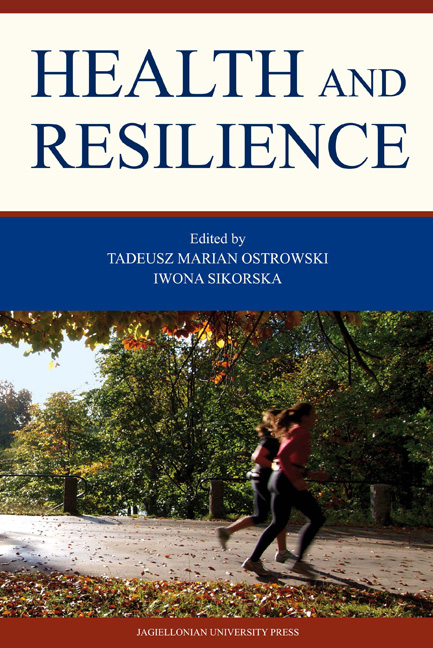Book contents
- Frontmatter
- TABLE OF CONTENTS
- Introduction
- I SOCIAL AND METHODOLOGICAL CONTECTS OF RESILIENCE
- II RESILIENCE IN DEVELOPMENT
- III RESILIENCE AND DISEASE
- Resilience as a chance of developmental success for a child with a chronic illness
- Coping with stress amongst families with children suffering from chronic psychosomatic diseases – recommendations for psychoprophylactic actions
- Styles of coping with negative emotions and stress in patients with hypertension
- Family life dimensions and self-assessment of adolescents and young adults using psychoactive substances – the comparative studies
- List of Authors
Resilience as a chance of developmental success for a child with a chronic illness
from III - RESILIENCE AND DISEASE
Published online by Cambridge University Press: 05 December 2014
- Frontmatter
- TABLE OF CONTENTS
- Introduction
- I SOCIAL AND METHODOLOGICAL CONTECTS OF RESILIENCE
- II RESILIENCE IN DEVELOPMENT
- III RESILIENCE AND DISEASE
- Resilience as a chance of developmental success for a child with a chronic illness
- Coping with stress amongst families with children suffering from chronic psychosomatic diseases – recommendations for psychoprophylactic actions
- Styles of coping with negative emotions and stress in patients with hypertension
- Family life dimensions and self-assessment of adolescents and young adults using psychoactive substances – the comparative studies
- List of Authors
Summary
Abstract
Chronic physical illness considered as a negative event, a potential stressor or a life crisis can be the risk factor for difficulties in the development of a child. Negative consequences of transactional influence of the factors associated with illness parameters, a child's personality and his or her environment occur particularly in the emotional and social development. This situation can be also the chance for stimulating a development of a child's personality and his or her growing as a person. The theoretical construct that in right way explains the positive transformation in understanding of the context of chronic illness – is a resilience. The meaning of this construct is discussed from the perspective of model proposed by E. Groetberg and assumptions of positive psychology, while its application value is showed in the light of the empirical data. The conceptualization of a developmental success refers to psychological well-being and being a mature and optimally functioning person.
Key words: child with a chronic illness, resilience, developmental success, psychological well-being, mature and optimally functioning person
Chronic somatic diseases are a civilizational hallmark of the life of contemporary man at all stages of his development. Medical statistics of the last a few decade shave shown an increase in the incidence of some chronic conditions, e.g. diabetes type I, allergy, asthma, or cancers.
- Type
- Chapter
- Information
- Health and Resilience , pp. 141 - 156Publisher: Jagiellonian University PressPrint publication year: 2014



